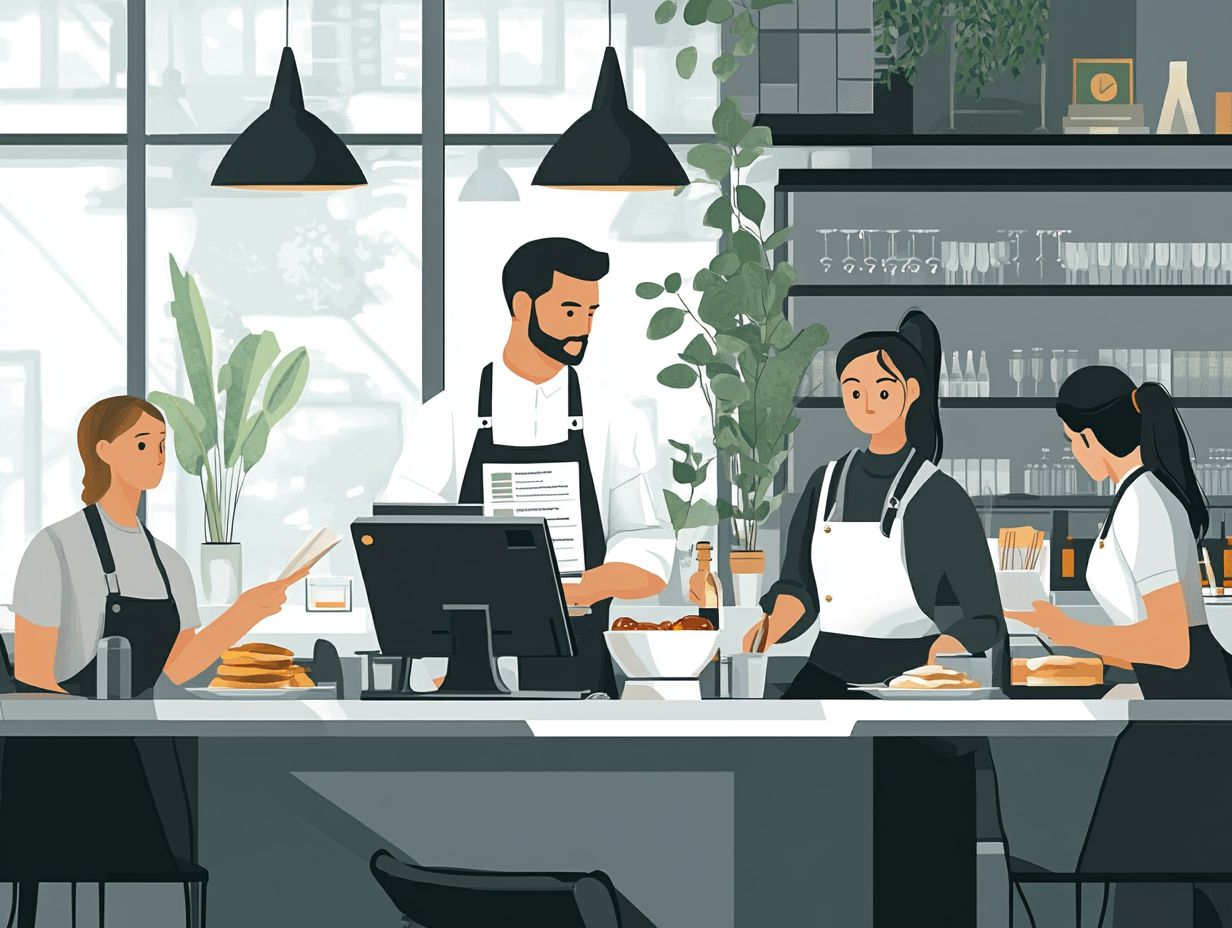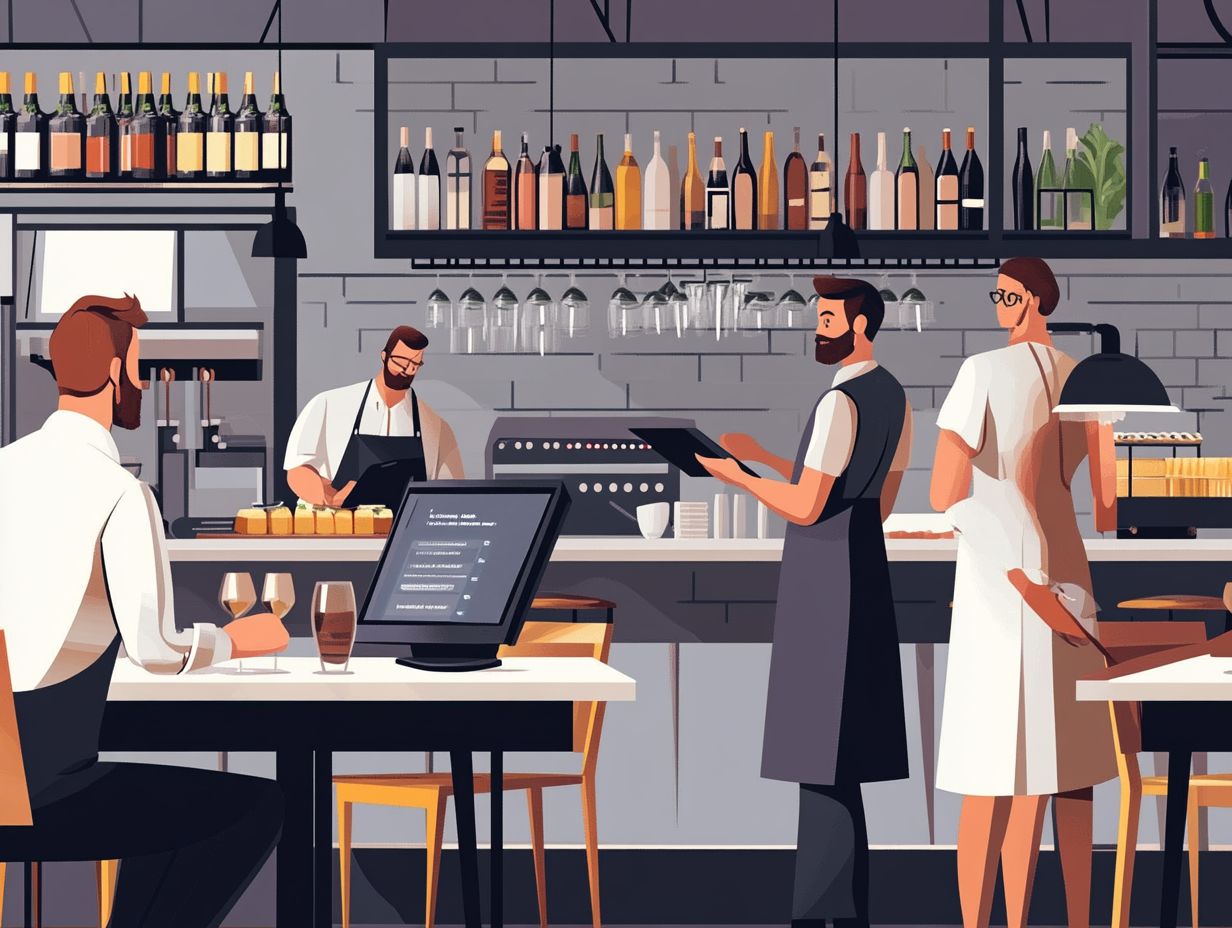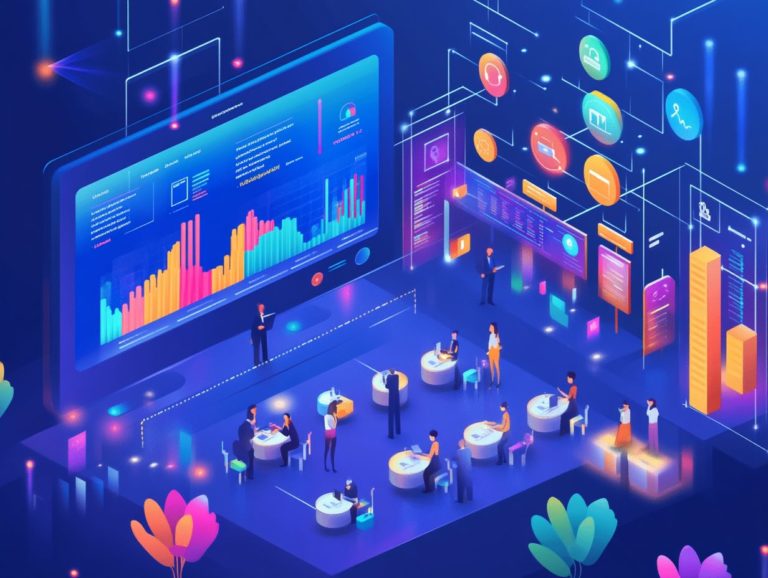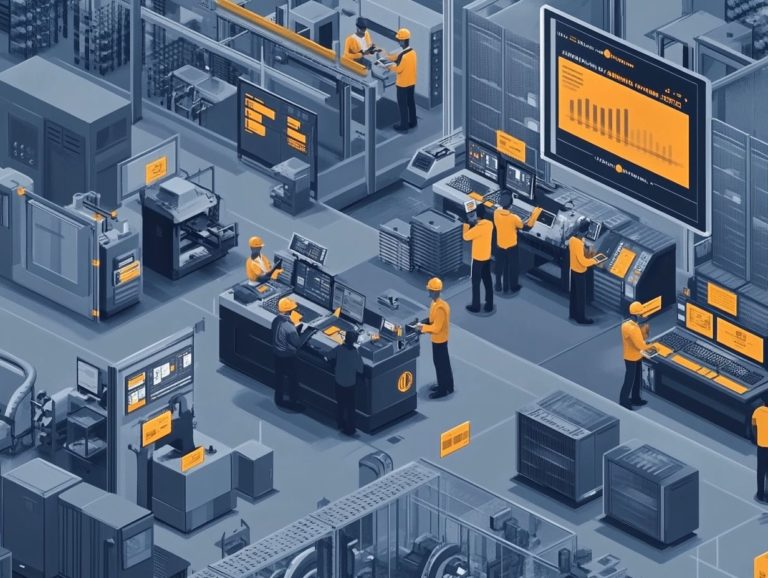36. The Role of CRM in Restaurant Management
In today’s competitive restaurant landscape, understanding Customer Relationship Management (CRM) is essential for your success. This article explores what CRM entails in the context of restaurant management and highlights its transformative benefits, such as improved customer experiences and increased operational efficiency.
You will find practical steps to implement CRM systems effectively while addressing common challenges like data management and technical issues.
We will also explore emerging trends that could redefine CRM in your industry. Discover how harnessing the power of CRM can elevate your restaurant to new heights of success.
Contents
- Key Takeaways:
- Understanding CRM in Restaurant Management
- Benefits of Using CRM in Restaurants
- Implementing CRM in Restaurant Management
- Common Challenges and Solutions
- Future of CRM in the Restaurant Industry
- Frequently Asked Questions
- What is the role of CRM in restaurant management?
- How does CRM benefit a restaurant business?
- What features should a restaurant CRM system have?
- Can CRM help with customer retention in a restaurant business?
- How can CRM improve the overall customer experience in a restaurant?
- Is CRM only beneficial for large restaurant chains?
Key Takeaways:

CRM is a vital tool in restaurant management. It provides a systematic approach to managing customer relationships and improving operations. By implementing CRM in your restaurant, establishments can enhance customer experiences, boost efficiency and communication, and remain competitive in a rapidly evolving industry. To successfully implement CRM, restaurants should consider key steps, tackle common challenges, and keep an eye on emerging trends and innovations for the future.
Understanding CRM in Restaurant Management
Grasping CRM in restaurant management is crucial for creating a seamless dining experience that enhances customer satisfaction and drives business growth.
As restaurant technology evolves, CRM systems have become essential for managing customer interactions, monitoring behavior, and analyzing insights to improve marketing strategies.
By effectively collecting and using customer data, you can create personalized communications, streamline service efficiency, and foster long-term loyalty through tailored loyalty programs. This ultimately sets your establishment apart in a competitive environment.
Defining CRM and Its Importance
Customer Relationship Management (CRM) in the restaurant world is a sophisticated strategy aimed at enhancing guest experiences by understanding and managing customer interactions, as highlighted in the role of CRM in event planning success.
Using data collected from various touchpoints, restaurant CRM systems seek to build a deeper connection with you, ensuring that your preferences and behaviors are carefully tracked. This engagement nurtures your loyalty and provides valuable insights for improving customer feedback management, helping restaurants better meet your needs.
Recognizing trends in your behavior helps restaurants tailor their services to you. This deep understanding not only increases your satisfaction but also enhances your retention, making CRM a vital component of any modern dining experience.
Benefits of Using CRM in Restaurants
Implementing a restaurant CRM system offers numerous advantages. It boosts customer engagement by allowing you to create personalized offers tailored to individual preferences.
It also streamlines operations, leading to improved efficiency that can transform your workflow.
Most importantly, CRM fosters customer retention strategies, ensuring that your patrons keep coming back, paving the way for sustained business growth.
Enhanced Customer Experience
Enhanced customer experience through restaurant CRM allows you to personalize services by leveraging customer profiling. This lets you tailor dining experiences based on individual preferences and order history.
This approach ensures that every guest feels uniquely valued and understood, creating connections that go beyond mere transactions.
For instance, if a diner frequently orders vegan dishes, your CRM tools can prompt staff to recommend new plant-based menu items or special promotions that align with their dietary preferences.
By analyzing past orders, you can also identify opportunities for upselling like suggesting a premium wine pairing with a favorite entr e or offering a dessert that perfectly complements the meal.
This level of personalized service not only boosts customer satisfaction but also encourages repeat visits, ultimately driving revenue growth through deeper customer loyalty.
Improved Efficiency and Communication

Now is the time to elevate your restaurant’s efficiency and communication. Integrating a CRM system can drastically enhance how your team operates!
Integrating a CRM system into your restaurant management can significantly elevate your efficiency and enhance internal communication among your staff. You ll benefit from real-time access to customer data and interaction history, allowing for smoother operations.
This streamlined approach enables your employees to swiftly retrieve pertinent information about patrons, such as past orders or dietary preferences, which encourages a more personalized service experience.
Improved communication channels within your team help minimize misunderstandings, ensuring that everyone is aligned and contributing to a cohesive workflow.
With immediate access to valuable insights, your restaurant can proactively anticipate customer needs, adapt offerings on the fly, and ultimately provide a superior level of service.
This responsive environment not only enhances customer satisfaction but also positively influences your establishment’s overall performance by driving repeat visits and reinforcing brand loyalty.
Implementing CRM in Restaurant Management
Implementing a CRM system in restaurant management requires a clear plan.
- Begin by selecting the right restaurant software tailored to your specific needs.
- Next, invest time in training your staff, ensuring they are fully equipped to utilize the system effectively.
- Finally, focus on the seamless integration of customer data into your daily operations, allowing for enhanced service and more personalized guest experiences.
Key Steps and Considerations
Key steps in implementing CRM systems involve assessing your restaurant’s specific needs, selecting the appropriate software, and training your staff on how to effectively utilize customer data to enhance service delivery.
As a restaurant owner, you’ll want to consider how the selected CRM integrates with your existing platforms, ensuring a seamless flow of data and a smooth transition.
Make sure to prioritize data security; safeguarding customer information not only fosters trust but also ensures compliance with privacy regulations.
It’s essential to communicate the benefits of the CRM to all your staff members, as their engagement is pivotal for successful adoption.
Once everything is in place, you can leverage CRM insights to tailor your marketing strategies, enhance loyalty programs, and create personalized experiences that ultimately boost customer satisfaction and retention rates.
Regularly analyzing customer feedback through the CRM system can drive continuous improvement in your service delivery, setting your restaurant up for long-term success.
Common Challenges and Solutions
In the realm of CRM implementation for restaurants, you may encounter several common challenges. Effectively managing customer data can be particularly daunting, as can navigating the technical issues that often accompany restaurant technology. Addressing these challenges proactively will position your restaurant for success in building stronger customer relationships.
Addressing Customer Data Management
Addressing customer data management is essential for ensuring data security while enabling effective customer interactions and collecting valuable feedback in the restaurant environment. In an industry where trust is everything, make sure to prioritize the protection of sensitive information by adhering to regulations like GDPR (General Data Protection Regulation) and CCPA (California Consumer Privacy Act), which are laws that protect personal information.
By implementing best practices such as data encryption, conducting regular audits, and providing comprehensive employee training you not only safeguard your patrons but also enhance your ability to gather insightful feedback.
This improved management of customer input allows you to tailor your services to better meet preferences, ultimately resulting in superior dining experiences. A transparent approach to data handling fosters stronger relationships, making customers feel valued and secure in sharing their thoughts and preferences with your establishment.
Act now to implement these strategies and watch your customer satisfaction soar!
Dealing with Technical Issues

Dealing with technical issues related to your restaurant software and CRM systems is crucial for minimizing disruptions in customer interactions and ensuring seamless management operations.
In this fast-paced industry, you re bound to face a range of technical challenges, from system integration hiccups to data management and connectivity woes. These obstacles can jeopardize operational efficiency and detract from the dining experience.
To navigate these complexities, investing in comprehensive training for your staff is essential. This ensures that everyone is proficient in utilizing the technology effectively. Ongoing maintenance of these systems is equally important; regular updates and troubleshooting can avert malfunctions that may lead to customer frustration.
By prioritizing these elements, you not only optimize service quality but also significantly enhance overall customer satisfaction.
Future of CRM in the Restaurant Industry
The future of CRM in the restaurant industry is changing rapidly, shaped by emerging trends and innovations that harness the power of data analytics.
These advancements are designed to elevate customer engagement, refine operations, and propel your business growth to new heights.
Trends and Innovations
Current trends and innovations in restaurant technology showcase the seamless integration of automated marketing, enhanced customer insights, and a strong emphasis on data security all aimed at elevating your dining experience.
As you explore these technologies, you’ll find new ways to engage with customers on a deeper level, offering personalized promotions that truly resonate with their unique preferences. Automated marketing solutions allow for effective segmentation of customer data, ensuring that diners receive timely and tailored promotions based on their tastes and past behaviors.
This level of customization not only fosters loyalty but also gives the power to your establishment to maintain a competitive advantage. Equally crucial is the focus on data security; restaurants must protect customer information to build trust and loyalty. With customers becoming increasingly aware of privacy concerns, it’s imperative for restaurants to prioritize this protection.
Potential Impact on Operations
The integration of CRM systems is set to transform your restaurant operations by enhancing service efficiency, refining customer retention strategies, and ultimately elevating your restaurant s overall performance.
By enabling seamless communication between your staff and patrons, CRM allows you to customize your offerings based on individual preferences and previous behaviors. This personalized touch not only cultivates loyalty but also drives repeat visits essential for survival in today s competitive market.
As you harness data analytics to uncover insights into dining trends and customer feedback, you can make informed adjustments to your menu and service styles.
Your potential for smooth operations grows, leading to increased guest satisfaction and a more robust bottom line.
Frequently Asked Questions
What is the role of CRM in restaurant management?

CRM, or customer relationship management, stands for a system that helps businesses track and improve their interactions with customers. It plays a crucial role in restaurant management by helping businesses understand and connect with their customers, improve customer satisfaction, and increase profitability.
How does CRM benefit a restaurant business?
CRM helps restaurants by providing valuable insights into customer behavior and preferences, which in turn enhances their operations. For instance, understanding these dynamics can significantly improve the overall experience in hotels, as detailed in how CRM improves guest experience in hotels. This allows for targeted marketing, personalized promotions, and streamlined customer communication and feedback.
What features should a restaurant CRM system have?
A restaurant CRM system should include features such as customer database management, analytics and reporting, marketing automation, loyalty program management, and integration with other restaurant management tools.
Can CRM help with customer retention in a restaurant business?
Yes, CRM can help with customer retention by providing personalized experiences and targeted promotions. Efficient communication methods also help build customer loyalty and keep them coming back to the restaurant.
How can CRM improve the overall customer experience in a restaurant?
CRM (Customer Relationship Management) enhances customer experience by delivering personalized and efficient service. It also manages feedback, complaints, and provides tailored recommendations and promotions based on customer preferences.
Is CRM only beneficial for large restaurant chains?
Absolutely! CRM is a game-changer for restaurants of any size. Even small, independent eateries can thrive by understanding their customers better and using targeted marketing to boost satisfaction and loyalty.






